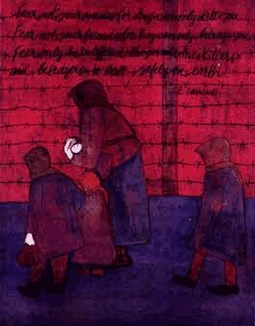CHOICE:
THE POWER OF CHOICE
The title of my homily for this feast of Mary’s Immaculate
Conception is, “The Power of Choice.”
Today we’re celebrating the feast of the Immaculate
Conception - the Patronal Feast of both the United States as well as this
parish of St. Mary’s.
As you know the Feast of the Immaculate Conception was
declared in 1854 and this church’s cornerstone was blessed in 1858 by St. John Neumann. On page 46 of Robert Warden’s book on our parish we read that the official
title of this church was always the “Church of the Immaculate Conception of the
Blessed Virgin Mary,” but he says it’s not clear just when this was
adopted.
MANY THEMES IN TODAY’S READINGS
There are many themes in the readings for this feast of the
Immaculate Conception:
· “Where are you?”
· Temptation to taste and bite into the forbidden,
· Blame, shame,
· Choice
·
· Eve - as the Mother of all the Living,
· Being blessed,
· Holiness,
· Love,
· Adoption,
· Being favored,
· Purpose,
· Hope,
· Angel - as messenger
· Being Called,
· Grace.
· Pondering,
· Being Named,
· Holy Spirit,
· Being Overshadowed,
· Barren - and being fruitful,
· Nothing is Impossible with God.
Those are just a few. I choose to speak a bit on choice.
A major theme in American life is freedom. America is very
much pro choice. I choose not to let that phrase refer only to those who choose
to allow abortion - especially since our choices include an impact on self and
others. And I see a deadly impact in abortion. So I’m using choice and pro
choice here in the context of freedom of choice - that it is a very strong national
value. We are the land so many people came to by choice from so many other
places. We're aware that some were brought here by force - as slaves. Then there are those here were
driven from their spaces - so when it comes to freedom - we don’t have an immaculate record.
The value of freedom and choice has always been part of
our value system. We stress freedom of the press, freedom of religion, freedom
of speech. All have consequences and bring limitations. Each includes the principle of impact of one person’s freedom on
another’s freedom. We've all heard the message: one can’t yell, “Fire” in a crowded movie. Freedom to swing
your fist, as they say, ends where my nose begins.
I remember reading somewhere that visitors to the United States
from some countries love to go to the Mall or a big grocery store and see all
the choices. Around here we can go to CVS, Rite Aid, The Annapolis Pharmacy, or get prescriptions by mail or what have you. We have Ford and Nissan. We have Giant and Safeway,
Graul’s and Wegman's is more and more on their way here. We have K-Mart and Wallmart. We have dozens of different types of cell phones and gadgets for communication.
Choices.
TODAY’S FIRST READING
In today’s first reading Eve chooses the forbidden fruit -
and the rest is history. She brings Adam into the deal. He blames her. She
blames the snake. And the rest is mystery.
Mistakes - bad choices - often tell us more about ourselves
than our successes. They expose our naked motives. They teach us there are
consequences. Hurts tell us more than helps - so so often.
We can take and eat forbidden fruit and our lives are
different forever. It ends our innocence and our paradises.
TODAY’S GOSPEL
In today’s gospel, Mary the New Eve, chooses God’s plan.
I like the great stress that like Eve - she is given a
choice. She asks questions like Eve. She ponders. She chooses God’s message for
her. He brings Christ into our world.
CHOICE
The message of the first reading is: Don’t eat the forbidden.
The message of the Gospel is: Eat God. Eat Christ.
Life is a choice about what we eat - about what we say "Yes" or "No" to.
We have a choice between the forbidden fruit and good fruit
- the goodness of Christ who bids us to bite into him and his good news every
day.
We have the choice of devolution - going backwards - or evolution - to keep growing and knowing God.
CONCLUSION
I just got back this afternoon from 4 days with some of our
high school seniors on a Kairos Retreat - our 21st.
We’re waiting in the lobby for the bus to arrive and get us
back here. I notice a picture there on the lobby wall. I think it was by Giotto - called the "Annunciation".
It is a picture of Mary hearing the word of God. Then in the background - off to the side - is Adam and Eve rejecting the word of God.
I had just read the readings for today to come up with a
homily on the bus coming back. I said to myself: there they are - both readings in that painting - the every day
choice - to be like Mary and choose the Good News or to choose the Forbidden
and end up in disaster. It’s our choice. Amen.




